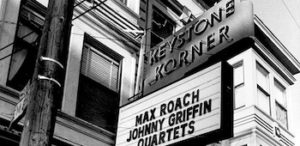
*This date in 1972 marks the opening night of the Keystone Korner nightclub, a jazz club in the North Beach neighborhood of San Francisco.
In 1969, Freddie Herrera bought Dino and Carlo's Bar in the North Beach section of San Francisco. He changed the name to Keystone Korner, a reference to Keystone Cops, because of its proximity to the Central Police Station on the opposite corner of Emery Lane. Keystone Korner began as a topless bar but quickly changed direction to live music to attract more customers. The strength of the music scene in San Francisco allowed Herrera to book young musicians who would go on to stellar careers.
Patrons filled the club to hear new pop talents such as Saunders and Garcia, Elvin Bishop, Neal Schon, Boz Scaggs, and The Pointer Sisters. Herrera's success made it possible to move across San Francisco Bay and open a larger room called Keystone Berkeley. He then sold the Keystone Korner to Todd Barkan, who converted the nightclub from a popular rock venue to an internationally famous jazz club. Barkan paid $12,500 (equivalent to $80,977 in 2021) for the Keystone Korner in 1972 and hired prominent jazz musicians to play there.
Early performers, including Sonny Rollins and Art Blakey, established the Keystone as one of the best jazz clubs in the nation—a reputation that continued to build as musicians Miles Davis, McCoy Tyner, Bill Evans, Betty Carter, and Stan Getz appeared on its stage. With economic challenges, Barkan closed the Keystone Korner in 1983. Many live recordings were made at the club. Jessica Williams was the house pianist for several years. In 2019, Barkan re-launched the Keystone Korner in Baltimore's Harbor East and opened the club on April 30, 2019.